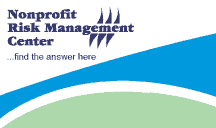|
October 21, 2009
Governance Matters
By Melanie Lockwood Herman
Strengthening the governance practices at your nonprofit requires more than a checklist or handbook touting “do’s” and “don’ts.” Leaders who want to inspire good governance must take the time necessary to look beneath the surface of often complex governance issues and commit to remedying issues that stand in the way of the board discharging its legal duties and providing exemplary leadership.
Lessons about good governance sometimes arise in my work as the Center’s CEO. Last year a brand-new Nonprofit Risk Management Center board member questioned the Center’s lack of a CEO succession plan. Despite my experience teaching nonprofit leaders that succession planning is a key component of risk management, my visceral reaction was that the new board member was possibly planning (plotting?) my “early” retirement! Upon reflection I realized that the new board member was raising a critical risk management issue that had been long overlooked by this CEO and his fellow board members. Within months we created and adopted what I consider a state of the art succession plan.
“Best practices” in nonprofit governance is a hot topic these days. Many organizations, including the Center, have published articles, checklists and guides on governance practices. The IRS jumped into the fray when it added new questions about governance practices to the Form 990. Too often, however, materials on good governance offer a far too narrow view of complex issues. At a workshop on September 25th that was part of the Annual Association Law Symposium sponsored by ASAE & The Center for Association Leadership, two experienced legal advisors spoke about the nuances of good governance. In their terrific session, Paula Cozzi Goedert of Barnes & Thornburg LLP and Jeff Tenenbaum of Venable LLP, offered insights on a dozen governance topics, including the subject of conflicts of interest involving board members.
Conflicts of Interest
Paula and Jeff explained to their audience that despite the prevalence of conflict of interest policies and annual disclosure statements, many board members do not understand the concept of conflicts and their completed forms reflect this lack of understanding. It is essential that every member of a nonprofit board understand their nonprofit’s definition of “conflict of interest” and recognize whether they have a conflict. Each board member must also be familiar with the process the nonprofit uses to address conflicts. As Jeff Tenenbaum pointed out, a nonprofit’s policies should not bar conflicts—not all conflicts are bad for the organization and in many cases conflicts are unavoidable. For example, your board may include employees of your top institutional donors, representatives of competing nonprofits, individual donors, and others whose roles may put them in a situation that requires specific action to avoid inappropriate participation in key decisions by the board. Policies that bar conflicts altogether are often impractical and may work against the mission of nonprofit.
The key for all nonprofits is to carefully define the term conflict and develop an effective procedure to remedy a conflict. Paula reminded the audience that there is no single right or wrong procedure to remedy a conflict. One area where a conflict may be a good thing and even necessary is where there are parent and subsidiary boards with overlapping memberships. Research has shown that harmony and institutional effectiveness increase where there is substantial overlap between the boards of parent and subsidiary nonprofits. Also keep in mind that sometimes conflicts of interest don’t involve personal financial gain—e.g., serving on the board of a competing organization. Paula cautioned attendees that there should be a mechanism to enable the treatment of conflicts “on the spot”—versus deferring to a committee that will review the matter at a later date.
Good Governance Resources Available from the Center
The Nonprofit Risk Management Center offers a range of resources for nonprofit boards and senior staff working to improve governance practices.
As part of our consulting practice we offer “governance audits” that involve the review of governing documents and policies and the delivery of a detailed report and high level briefing on the top governance risks facing the organization and the adequacy of current risk management measures. The capstone of these assignments is a list of specific but practical recommendations for managing governance risks. To inquire about this service.
Another governance resource is the just-released book EXPOSED: A Legal Field Guide for Nonprofit Executives. Exposed includes a thoughtful chapter on the liability exposures of the nonprofit board with helpful guidance on managing governance risks. Additional information on Exposed is available at: http://nonprofitrisk.org/store/exposed.shtml. The Center’s full catalog of publications is available at: http://nonprofitrisk.org/store/catalog.shtml.
For leaders seeking help designing practical policies the Center offers
My Risk Management Policies, an easy-to-use, affordable online tool that will help you craft custom policies for your nonprofit, including a conflict of interest and other important governance policies. For more information on this brand-new tool, visit: http://nonprofitrisk.org/tools/mrmp/mrmp.shtml. To purchase the tool, visit www.MyRiskManagementPolicies.org. The one-time cost of My Risk Management Policies is $179.
In addition to our consulting services, publications and online tools, the Center is frequently asked to design and deliver presentations on the topic of “governance risks” to audiences of nonprofit leaders. We travel across the country (and sometimes to other parts of the world) to present informative, practical educational programs to audiences of senior staff and volunteer leaders. To inquire about availability and cost, call (202) 785-3891. To view a list of upcoming engagements, visit: http://nonprofitrisk.org/calendar/speaking.shtml.
|


